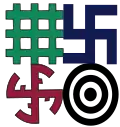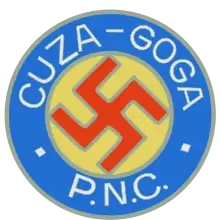Octavian Goga
Octavian Goga (Romanian pronunciation: [oktaviˈan ˈɡoɡa]; 1 April 1881 – 7 May 1938) was a nationalistic and, later, far-right Romanian politician, poet, playwright, journalist, and translator.
Octavian Goga | |
|---|---|
.jpg.webp) | |
| 37th Prime Minister of Romania | |
| In office 28 December 1937 – 10 February 1938 | |
| Monarch | Carol II |
| Preceded by | Gheorghe Tătărescu |
| Succeeded by | Miron Cristea |
| Minister of the Interior | |
| In office 30 March 1926 – 4 June 1927 | |
| Prime Minister | Alexandru Averescu |
| Preceded by | Ion I. C. Brătianu |
| Succeeded by | Barbu Știrbey (interim) |
| Minister of Culture and Religious Affairs | |
| In office 5 December 1919 – 16 December 1919 | |
| Prime Minister | Alexandru Vaida-Voevod |
| Preceded by | Alexandru Lupescu |
| Succeeded by | Ion Borcea |
| In office 13 June 1920 – 16 December 1921 | |
| Prime Minister | Alexandru Averescu |
| Preceded by | Ion Borcea |
| Succeeded by | Vasile Dumitrescu-Brăila |
| Co-Leader of the National Christian Party | |
| In office 16 July 1935 – 10 February 1938 | |
| Preceded by | Himself (as president of the National Agrarian Party) A. C. Cuza (as president of the National-Christian Defense League) |
| Succeeded by | None (party banned under the 1938 Constitution) |
| Founding President of the National Agrarian Party | |
| In office 10 April 1932 – 16 July 1935 | |
| Succeeded by | Himself (party merged into the National Christian Party) |
| Personal details | |
| Born | 1 April 1881 Resinár, Lands of the Crown of Saint Stephen, Austria-Hungary |
| Died | 7 May 1938 (aged 57) Ciucea, Romania |
| Nationality | Romanian |
| Political party | Romanian National Party (before 1918) People's Party (1918-1932) National Agrarian Party (1932-1935) National Christian Party (1935-1938) |
| Spouse(s) | 1906-1920: Hortensia (b. Cosma) (first wife); 1921-1938: Veturia (b. Mureșan) (second wife) |
| Profession | poet, journalist |
| Signature |  |
| Part of a series on |
| Fascism in Romania |
|---|
 |
Life and politics
Goga was born in Resinár (now Rășinari), near Nagyszeben (now Sibiu).[1]

Goga was an active member in the Romanian nationalistic movement in Transylvania and of its leading group, the Romanian National Party (PNR) in Austro-Hungary. Before World War I, Goga was arrested by the Hungarian authorities. At various intervals before the union of Romania and Transylvania in 1918, Goga took refuge in Romania, becoming active in literary and political circles. Because of his political activity in Romania, the Hungarian state sentenced him to death in absentia.
During World War I, he joined the Romanian Army and took part as a soldier in the Dobruja campaign.
Together with Vasile Goldiș, Ioan Lupaș and Silviu Dragomir, Octavian Goga left the PNR in 1926 and joined General Alexandru Averescu's People's Party (PP), a populist movement created upon the war's end. Interestingly, Goga, Goldiș, Lupaș and Dragomir were all Orthodox, whereas the PNR leader Iuliu Maniu and other remaining members of the PNR were Greek-Catholic.
Goga clashed with Averescu over the latter's conflict with King Carol II. Together with Goldiș, Lupaș and Dragomir, Goga founded the National Agrarian Party on April 10, 1932. This party he led into an alliance with A. C. Cuza's far right, anti-Semitic National-Christian Defense League, forming the National Christian Party on July 14, 1935.


When the National Liberal Party lost the elections in December 1937, King Carol II appointed Goga Prime Minister of Romania, although the National Christian Party had obtained only 9.15% of the votes for the house. Carol II expected the government to be transitional, allowing him to get rid of the party system. He wrote in his diary that he was conscious that the government would not last long and that, after its collapse, he would be able to free his country and himself from the tyranny and the petty interests of the parties. This calculation proved correct. However, the King miscalculated the impact of the anti-Semitic measures of the Goga cabinet, which he had to deal with throughout his personal regime (the so-called royal dictatorship) that he established on February 10, 1938. The Goga cabinet stripped the Jews off their citizenship, limited their right to work or simply harassed them through its anti-Semitic measures, in an effort to gain the support of the electors of the Iron Guard, another anti-Semitic movement and the rival of both the National Christian Party and the King. As a result, the Goga cabinet damaged the Romanian economy and the relations with France, Great Britain and the League of Nations and strengthened the Iron Guard. Its „revision of the Romanian citizenship”, as implemented by King Carol II's personal regime, denaturalised 225.222 Jews, i.e. approximately 30% of the population of Jewish faith.
The paramilitary wing of the National Christian Party, the Lănceri (meaning "Lancers", the word was derived from LANC, the Romanian acronym of National-Christian Defense League) contributed to the chaos, attacking both Jews and Iron Guard members.
Carol II first pushed towards a victory of the government in the snap elections in March 1938, which he had called on January 18, 1938. However, he soon abandoned Goga, preparing a coup together with the minister of the Interior Armand Călinescu, a former member of the National Peasants' Party, who acted as a guarantee for the king in the government. The coup was probably precipitated when Goga negotiated an electoral agreement with Corneliu Zelea Codreanu, the leader of the Iron Guard, on February 8, 1938, thus posing a considerable threat to the King's power. On February 9, 1938, Carol II, Călinescu and the former national liberal prime minister Gheorghe Tătărescu set the coup for the next day. On February 10, 1938, Carol II received Goga and told him to postpone the snap elections, whereupon Goga resigned. Goga refused to participate in the national unity government the king appointed the same day and withdrew to his estate in Ciucea, Transylvania, where he suffered a stroke on 5 May 1938. He died two days later, on May 7, 1938. [2]
Quotations
In press interviews at the time Goga said the following:
The Jewish problem is an old one here, and it is a Romanian tragedy. Briefly, we have far too many Jews.
— TIME interview, 1938
For us there is only one final solution of the Jewish problem—the collection of all Jews into a region that is still uninhabited, and the foundation there of a Jewish nation. And the further away the better.
— 1938 interview[3]
Writings
Poetry
- Cărbunii ("The Pieces of Coal")
- Rugăciune ("A Prayer")
- Plugarii ("The Ploughmen")
- Oltul ("The Olt River")
- Din larg ("From the High Seas")
- Profetul ("The Prophet")
- Ceahlăul ("The Ceahlău")
- O ramură întârziată ("A Tardy Branch")
- Trecutul ("The Past")
- Apus ("Sunset")
- Mare eternă ("The Eternal Sea")
- În mine câteodată ("At Times within Me")
- Toamna(Autumn)
Plays
- Domnul notar ("Mr. Notary")
- Meşterul Manole (see Meşterul Manole)
References
- MacGregor-Hastie, Roy (1969). Anthology of contemporary Romanian poetry. Owen. p. 36. ISBN 9780720602807.
- Quinlan, Paul D. (1977). Clash over Romania: British and American policies toward Romania, 1938-1947. American Romanian Academy of Arts and Sciences. p. 29. ISBN 9780686232636.;
Rudolph Tessler, University of Missouri Press, 1999, Letter to My Children: From Romania to America Via Auschwitz, p. 31;
Itamar Levin, Greenwood Publishing Group, 2001, His Majesty's Enemies: Great Britain's War Against Holocaust Victims and Survivors, p. 46;
Ivan T. Berend, University of California Press, 2001, Decades of Crisis: Central and Eastern Europe Before World War II, p. 337;
Haynes, Rebecca "Reluctant Allies? Iuliu Maniu and Corneliu Zelea Codreanu against King Carol II of Romania" pages 105-134 from The Slavonic and East European Review, Volume 85, Issue # 1, January 2007 page 121;
Philippe Henri Blasen: De la nomination du cabinet Goga au coup dʼÉtat du roi Carol II (28 décembre 1937-10 février 1938), in: Studia Universitatea Babeș-Bolyai - Historia, 2018;
Philippe Henri Blasen: Lʼémancipation graduelle des Juifs de Roumanie et la révision de la citoyenneté roumaine sous le gouvernement Goga. Aspects juridiques (1878-1938) et historiques (1937-1938), in: Revista de Istorie a Evreilor din România, 2018. - "Jews Spurned in Rumania". The Argus. Independent Cable Service. 24 January 1938. p. 9.
External links
| Romanian Wikisource has original text related to this article: |
- Works by or about Octavian Goga at Internet Archive
- Works by Octavian Goga at LibriVox (public domain audiobooks)

